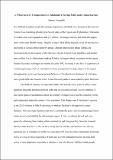Files in this item
When security trumps identity : Uzbekistan’s foreign policy under Islam Karimov
Item metadata
| dc.contributor.author | Fumagalli, Matteo | |
| dc.contributor.editor | Laruelle, Marlene | |
| dc.date.accessioned | 2019-11-30T00:34:37Z | |
| dc.date.available | 2019-11-30T00:34:37Z | |
| dc.date.issued | 2017-11 | |
| dc.identifier | 251119966 | |
| dc.identifier | 2aa32271-6617-49d9-9114-292bd73e92cf | |
| dc.identifier.citation | Fumagalli , M 2017 , When security trumps identity : Uzbekistan’s foreign policy under Islam Karimov . in M Laruelle (ed.) , Constructing the Uzbek State : Narratives of Post-Soviet Years . Lexington Books , Lanham , pp. 3-19 . | en |
| dc.identifier.isbn | 9781498538367 | |
| dc.identifier.isbn | 9781498538374 | |
| dc.identifier.other | ORCID: /0000-0002-1451-2088/work/38548530 | |
| dc.identifier.uri | https://hdl.handle.net/10023/19033 | |
| dc.description.abstract | The death of Uzbekistan’s first president Islam Karimov in September 2016, after twenty-seven years in office, raises questions about the domestic political order and the evolution of state–society relations. It also opens space to uncertainties about the country’s foreign policy and the continuity of the path undertaken under the country’s first president. This chapter uses Uzbekistan’s reaction to the 2010 violence in Osh, Kyrgyzstan, to explore Tashkent’s foreign policy under Karimov. The case study demonstrates that Uzbekistan did play a role in maintaining Central Asian security and stability by refraining to support Uzbek co-ethnics abroad and more generally refraining from linking ethnic nationalism and foreign policy. Security trumped identity under Karimov’s rule. As the country moves into the post-Karimov era, the key questions are: (1) whether or not the new president will resort to ethnic nationalism in foreign policy as a way to boost legitimacy at home and (2) will Tashkent renounce its long-held policy of non-alignment, especially in relation to ties with Russia. Will the Uzbek people continue to “not be dependent on anyone,” as President Karimov himself maintained in the aftermath of the Andijan events in 2005, when a government crackdown on protesters led to hundreds deaths and thousands of people seeking refuge beyond the border. Preserving the country’s sovereignty and independence, non-alignment, and regime security and survival defined Uzbekistan’s foreign policy under Karimov. Ethnicity hardly played any role in Uzbekistan’s relations with its neighbors. In analyzing popular reactions to Uzbekistan’s handling of the 2010 Osh violence, the chapter shows that Tashkent’s long-held position came under criticism at the time. In the post-Karimov era, as the new leader(s) seek to boost their legitimacy domestically, resorting to ethnic nationalism might be a relatively easy card to play. Should the tragic events of 2010 repeat themselves, Uzbekistan’s traditional policy of non-intervention is likely to come under stress. | |
| dc.format.extent | 17 | |
| dc.format.extent | 491091 | |
| dc.language.iso | eng | |
| dc.publisher | Lexington Books | |
| dc.relation.ispartof | Constructing the Uzbek State | en |
| dc.subject | Uzbekistan | en |
| dc.subject | Karimov | en |
| dc.subject | Foreign Policy | en |
| dc.subject | Irredentism | en |
| dc.subject | Uzbek minorities | en |
| dc.subject | Central Asia | en |
| dc.subject | Ethnicity | en |
| dc.subject | Osh conflict | en |
| dc.subject | Kyrgyzstan | en |
| dc.subject | JZ International relations | en |
| dc.subject | SDG 16 - Peace, Justice and Strong Institutions | en |
| dc.subject.lcc | JZ | en |
| dc.title | When security trumps identity : Uzbekistan’s foreign policy under Islam Karimov | en |
| dc.type | Book item | en |
| dc.contributor.institution | University of St Andrews. School of International Relations | en |
| dc.date.embargoedUntil | 2019-11-30 | |
| dc.identifier.url | https://rowman.com/ISBN/9781498538367 | en |
This item appears in the following Collection(s)
Items in the St Andrews Research Repository are protected by copyright, with all rights reserved, unless otherwise indicated.

